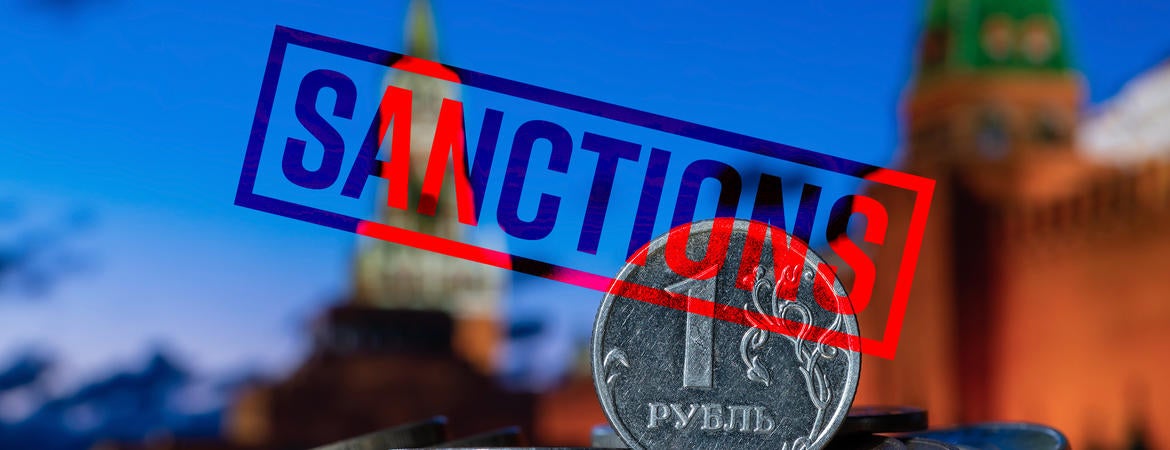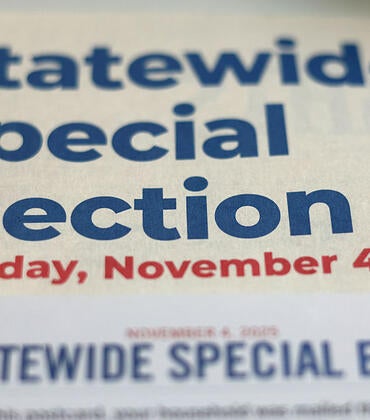
UCR Professor Jana Grittersová is a native of Slovakia, which borders Ukraine. She is a former central banker at the National Bank of Slovakia and an economist at the European Commission, the executive body of the European Union. Grittersová has studied and written extensively on the political economy of transition and reform in the post-communist countries of Central and Eastern Europe, including Ukraine. We asked her to provide context for the potential of EU sanctions.

Q: Switzerland surprised many by announcing it will adopt all the sanctions that the European Union has imposed on the Russian people and companies. Can you explain the significance of this move, including if it assures the assets of Russian oligarchs are frozen?
A: When Switzerland announced that it will forego its commitment to neutrality and adopt the EU sanctions, it said in others words that it will not be used as a “platform” to avoid EU sanctions. There are several implications of this step.
1) Historical: Switzerland did not breach neutrality even during World War II. Swiss President Ignazio Cassis said this decision will in fact safeguard Switzerland’s independence and neutrality because “playing into the hands of an aggressor is not neutral” and Switzerland is “bound to humanitarian order” by the Geneva convention of human rights. At the same time, Switzerland is also anxious to play a role of an international intermediary and keep channels open between countries that no longer have diplomatic relations.
2) Economic: Switzerland has a reputation as a safe haven for the assets of Russia’s rich and most powerful. According to the Swiss National Bank, Russians held nearly 10.4 billion Swiss francs (or $11.24 billion) in Switzerland in 2020. That represented about 30 percent of the total Russian deposits overseas of nearly $36 billion according to the Bank of International Settlements in Basel. Financial institutions in Switzerland are now banned from business relationships with 363 Russian individuals and four Russian companies. This includes Russian President Vladimir Putin, Prime Minister Mikhail Mishustin, and Foreign Minister Sergei Lavrov, and five financial oligarchs close to the Putin regime.
In other words, after initial steps to impose travel bans against Russians on the EU sanctions list and stop Swiss banks from accepting new Russian money, the Swiss government decided to freeze Russian financial assets in the country, including the access of selected oligarchs to their bank accounts. Commodity trading remains intact, however, because it is not included in EU sanctions. It is important to note that Switzerland is a major hub for commodities trading like oil and wheat that matter to Russia. Approximately 80 percent of Russia’s commodities trade goes through the Swiss financial services centers of Geneva, Zug, Lugano, and Zurich.
3) Domestic politics: The Swiss government is trying to walk a fine line between showing solidarity with the EU and maintaining its traditional neutrality. It had faced public criticism for its inaction. Around 20,000 people demonstrated in the Swiss capital Bern against war and to support Ukraine, the biggest anti-war march in decades. Therefore, the Swiss government’s decision may be a response to public pressure to side clearly with the EU against the Putin regime.
Q: What are the present effects of the sanctions? Does the Russian economy survive if this level of reprisals continues?
A: The most devastating are the sanctions preventing the Central Bank of Russia from accessing its foreign exchange reserves denominated in Euros and dollars. Also significant are sanctions preventing Russian banks from using the SWIFT (the Society for Worldwide Interbank Financial Telecommunication) global financial messaging system.
No large economy among the G-20 countries has ever faced such broad and severe sanctions that will hit all societal groups in Russia, from oligarchs to common people. The degree of multilateral sanctions coordination is also historically unprecedented. We can already see the effects of the latest financial sanctions imposed by the U.S., the European Union, and other countries, including Switzerland, a historically neutral country, in response to Russia’s invasion of Ukraine. The value of the ruble has plummeted to record lows against the U.S. dollar (over 30% decline since January) and is worth less than one cent.
The Russian central bank more than doubled the country’s key interest rate from 9.5% to 20% to stabilize the ruble. The interest rate hike, however, will considerably raise the price of borrowing for businesses and consumers. For instance, VTB, Russia’s second-largest bank, announced that sanctions would force it to substantially increase its mortgage rate by four percentage points to 15.5%.
All three major credit rating agencies (S&P, Moody’s, and Fitch) downgraded Russia’s sovereign debt to “junk” status (i.e. below investment grade). The downgrade can push up Russia’s costs of borrowing (to finance the war, for example) but also heightens the risk of sovereign debt default. Russia has over $700 million worth of government bond payments due this month.
The Russian stock market is closed. Oil companies from British Petroleum, Exxon Mobil, Shell, but also Volvo, General Motors, and others are either exiting or cutting their investments in Russia, adding to the country's economic problems. Russian banks are failing. The share price of Sberbank, Russia’s largest state-owned bank, where around half of the Russian families have accounts, fell sharply by 95% and experienced significant deposit outflows. Other major Russian stocks saw similar declines, including Lukoil, Novatek, and Rosneft. In addition to interest rate hikes, the Russian government and central bank responded to sanctions by ordering exporting companies to convert 80% of their proceeds to the domestic market and banning foreign investors from selling assets. The government also plans to use its National Wealth Fund to counteract sanctions.
In sum, we can expect that there will be very little growth in Russia. The “cosmetic” sanctions imposed on Russia after the annexation of Crimea in 2014 had a relatively minor impact on the Russian economy: according to the International Monetary Fund’s estimates, they reduced Russia’s economic growth up by up to 1.5% per year. However, the sanctions facing Russia now are more stringent, thus they may have a more substantial impact on the Russian economy. For instance, the Institute for International Finance now expects a double-digit contraction of Russia’s economy. Iran or Venezuela can be perhaps laboratories for the effect of sanctions on Russia’s economy. Russia may experience an economic crisis similar to that in the early 1990s after the collapse of communism.



